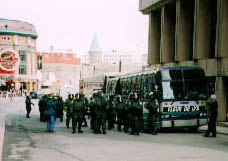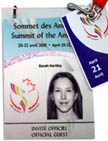![]()
 |
|
The landing of the small Air Canada plane I was on at the normally quiet Quebec City airport this past Friday - the opening of the Summit of the Americas - felt altogether different than it did just a few weeks earlier from the second the plane touched down. My first clue of the military state I was about to enter as an "official guest" from civil society was the four army helicopters lining the runway, the official government planes parked on the edges and the hordes of security men and black cars parked where the plane was about to dock. The pilot makes an announcement that members of the Guyanese, Jamaican and Bolivian delegates are on our plane, and could we please let them depart before the rest of us? Once in the terminal I can see that army personnel and security, secretariats and police officers are crawling over everything: keeping doors locked except for exits, crawling over the baggage claim, interrogating those of us here to pick up security badges.
|
My
Security Pass: |
And so, my ordeal began. They couldn't find my security pass that would allow me inside the perimeter, so they sequestered me in a holding room where I was soon joined by members of the Bolivian delegation who were also having their passports scrutinized. Lucky for me, a middle-aged secretariat decided to take pity on a young pretty girl and so my security pass was soon in my hands. As he lead me outside to put me in an official car, his parting words were: "Your security badge is like gold. Wear it everywhere, all the time. You will most likely be challenged even with the badge. Good luck." And so it was with this caution in my mind that I would soon discover how true his words were. |
On the drive from the airport the van travelled on newly built and unpaved roads. All along the river, heavily armed police officers stood watch. A helicopter hovers over the bridges that cross the St. Lawrence River watching for terrorists. At this point, I'm not sure if I really do want to be inside the perimeter. Seven security check points later, I checked into the Chateau Frontenac Hotel inside the perimeter fence a.k.a Wall of Shame. Just to enter the hotel, and every time after that, I had to show my security pass at three different check points, go through a metal detector and put my bag through the x-ray scanner. I also had my bag searched a number of times, and was asked questions like, "What's this?" about my iBook laptop computer and power cord.
 A protest begins at the perimeter fence during the people's march on Saturday. The clouds are tear gas. |
|
|
Leaving the hotel for lunch and meetings at other hotels inside the perimeter revealed the true extent of the security in place: snipers and video cameras on the tops of buildings, armed police every block, police escorts for the leaders' cars, and buses of army soldiers being taken to trouble spots along the fence. 24 hours a day, police helicopters survey the city and the wall from above. After leaving the Radisson hotel near Rene-Levesque Blvd. From our first Civil Society meeting, our senses were instantaneously assaulted by clouds of tear gas. Looking toward the wall, I was stunned. A mass of over 100 army personnel in full riot gear stood shoulder to shoulder and three men deep across the six lane street in front of protesters trying to bring down the fence. I wanted to get closer but without a gas mask or even a scarf, the tear gas drove me down the hill. There was no choice but to return to the hotel and watch what was happening at the fence on TV. |
After having been inside for a full day at this point, I can say for sure that myself and Marie-Michèle are the only young people inside the entire wall. Friday night, we were unable to meet up with our Students Commission counterparts outside the wall - the police at the gate could not guarantee that we would be let back in to our hotel as they were anticipating a "lock down" later that night.


